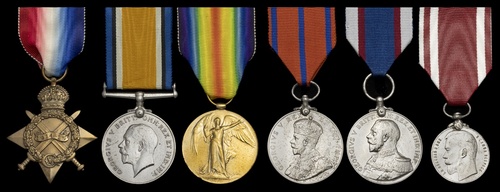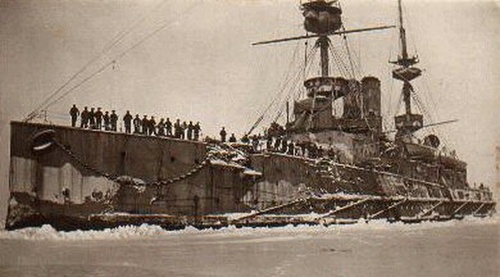Auction: 25001 - Orders, Decorations and Medals
Lot: 68
Six: Leading Seaman W. H. Harris, Royal Navy who was awarded the Russian Medal for Zeal whilst aboard the Jupiter on her epic icebreaking mission to Archangel in 1915; he served with the Metropolitan Police either side of the Great War and latterly with 'X' Division
1914-15 Star (12366 W. H. Harris. L.S. R.N.); British War and Victory Medals (12366 W. H. Harris. L.S. R.N.); Royal Fleet Reserve L.S. & G.C., G.V.R. (212366 (Dev.B 1735) W. H. Harris L.S. R.F.R); Coronation 1911, Metropolitan Police issue (P.C., W. Harris.); Russia, Imperial, Medal for Zeal (212366 W.H. Harris Lg.Sea. H.M.S. Jupiter), impressed naming, claw and ring suspension to this last, very fine (6)
William Henry Harris was born on 2 June 1884 at Stratford on Avon, Warwickshire. On enlistment into the Royal Navy as Boy 2nd Class, he was allocated to the Devonport Division and joined Impregnable, the Boys Training establishment, then moored in the River Tamar at Devonport. Harris spent eighteen months aboard Impregnable before being sent to Agincourt, an old cruiser that was then operating as a sea going training ship for boys. Agincourt was based at Portland and mostly spent time in the English Channel. On leaving Agincourt, Harris was rated an Ordinary Seaman and drafted to Vivid, the depot ship at Devonport. While at Devonport Harris spent time at Cambridge, the gunnery school and Defiance, the Torpedo school, being rated an Able Seaman during 1903.
On 1 March 1904, Harris received his first sea going draft being posted to Andromeda, an 11000-ton cruiser that was commissioned for the China station. After serving aboard for a full commission, Harris on returning to Devonport purchased his discharge from the Royal Navy.
He joined the Metropolitan Police Force on 25 February 1907, serving in 'X' Division (Warrant No. 94257). With the outbreak of the Great War, Harris was recalled for service and rated as Leading Seaman joining Talbot, part of the 12th Cruiser Squadron operating in the Western Channel. Harris only spent a short period of time aboard but might have still been aboard when Talbot captured a German merchant ship during September.
Harris was next drafted to Jupiter. In January 1915 the Admiralty received a request for assistance from the Russian Government, as their icebreaker used to keep open the passage to Archangel in the White Sea had broken down. In response the Royal Navy sent out Jupiter, an old Majestic-class battleship. She departed for Archangel in February 1915, freeing en route a number of vessels stuck in the ice, occasionally by using explosive charges. She, too, sometimes became icebound, but still managed to make a major impression on the problem, improving the safe passage of numerous vessels, many of them laden with highly important war materials, among them the S.S. Thracia. The latter was taken in tow after the use of explosive charges to free her.
Throughout these operations it was not unusual for the temperature to fall as low as minus 20 degrees, a hard test indeed on the morale and wellbeing of the Jupiter's crew. Her mission completed by May 1915, the Tsar expressed his gratitude by the presentation of a variety of Russian Honours and Awards to her crew, including Harris.
After spending the remainder of 1915 at Devonport he was drafted to Marksman, allocated to the 12th Destroyer Flotilla which was serving with the Grand Fleet. Marksman, with Harris aboard, took an active part in the Battle of Jutland. During the battle Marksman picked up the captain of the destroyer Ardent that had been sunk taking part in the last skirmish of the battle. The following day Marksman came across the crippled destroyer Sparrowhawk, which had had her stern blown off. Marksman initially tried to tow Sparrowhawk, but the strain was too much, and the crew were taken off and the destroyer sunk.
During late 1917 and early 1918 Marksman served with the Dover Patrol before returning to the Grand Fleet. The Great War over, Harris was demobilised on 19 February 1919 and returned to the Police Force, being pensioned on 29 February 1932.
In the 1939 Register Harris is recorded as living at Homefield Harris Lane, Shenley, Hertfordshire, with his wife, Ellen. According to the splendid The Metropolitan Police, the men and their Medals, Volume 1 by Jim Kemp, Harris served as a Reserve Officer during the Second World War. It is possible he is entitled to a Defence Medal. 'X' Division suffered several casualties when a bomb exploded in Kilburn on 6 November 1940.
Subject to 20% VAT on Buyer’s Premium. For more information please view Terms and Conditions for Buyers.
Estimate
£600 to £800
Starting price
£550







